Papers written by Hodgkin, Ernest P. (Doctor, b.1908 - d.1998) - Part 14
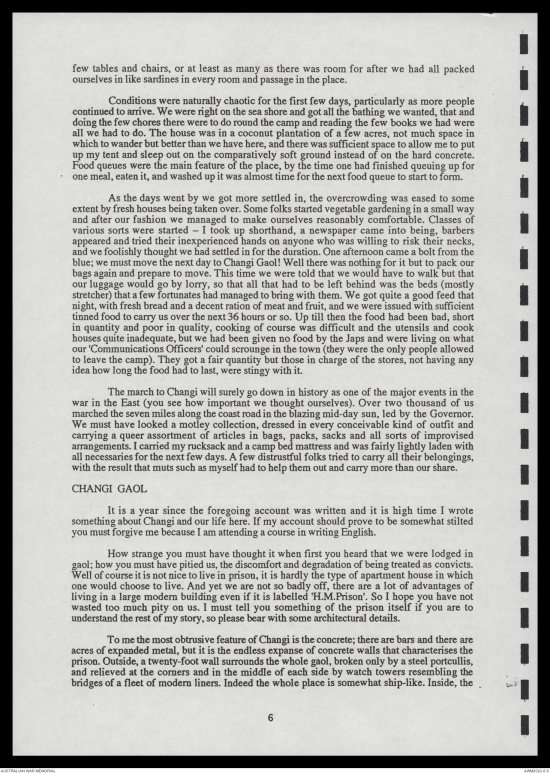
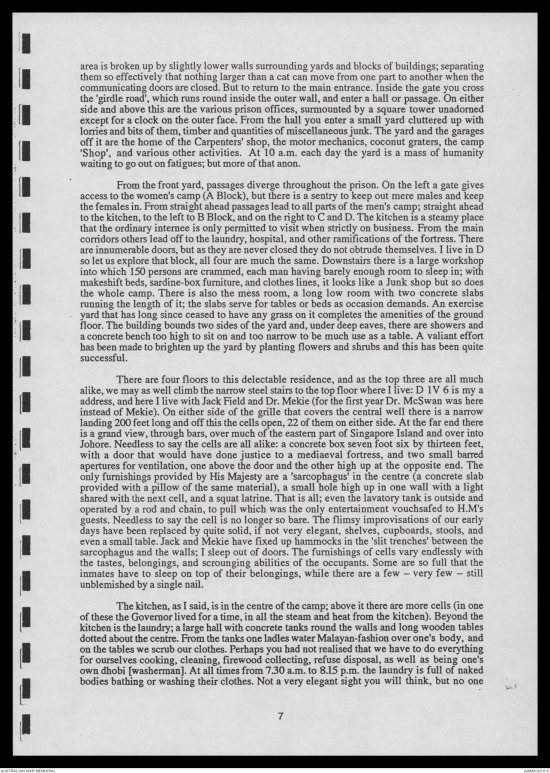
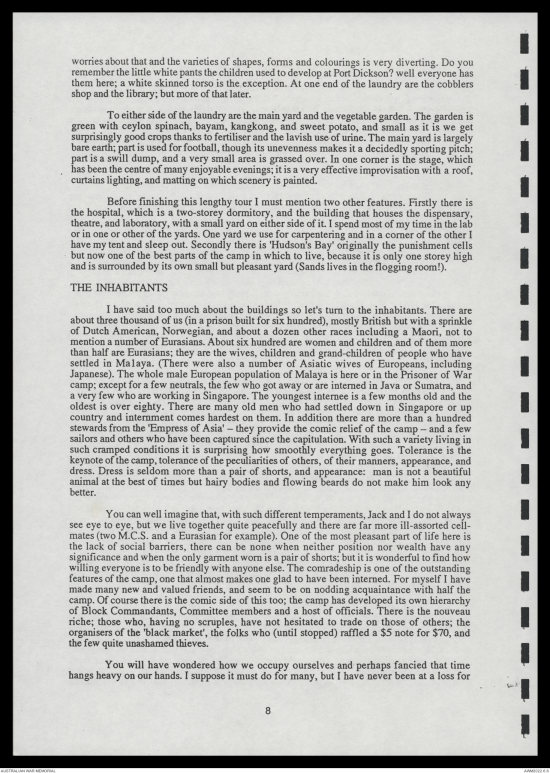
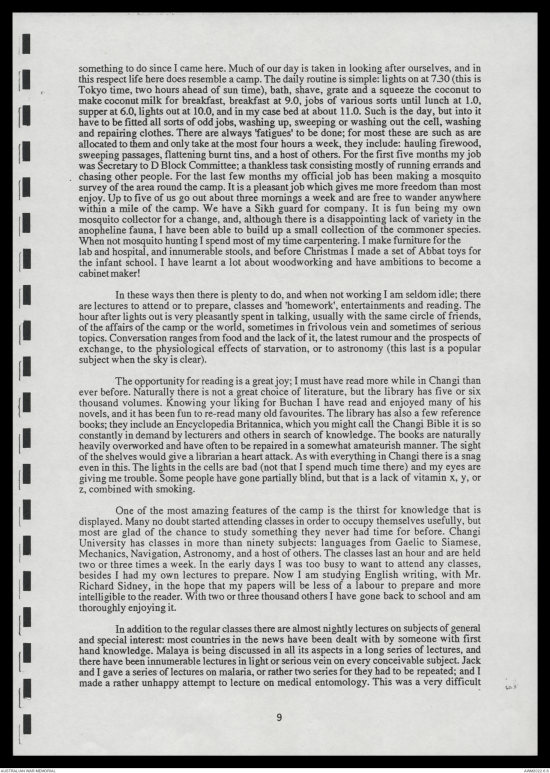
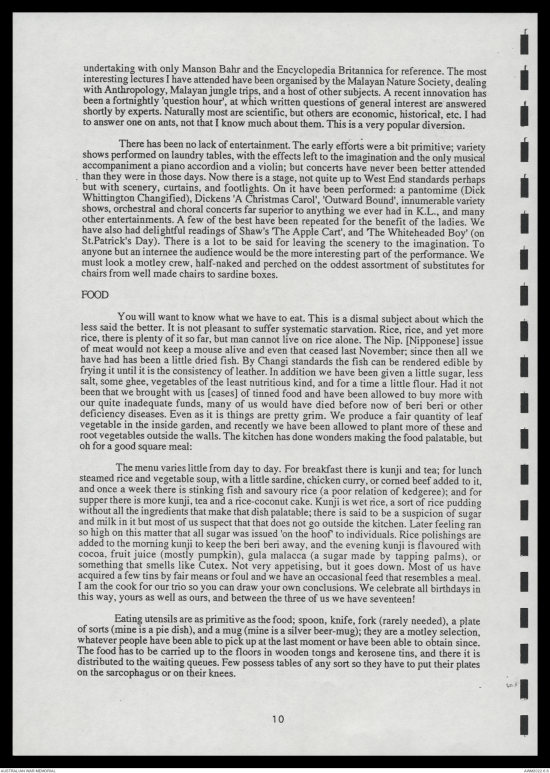
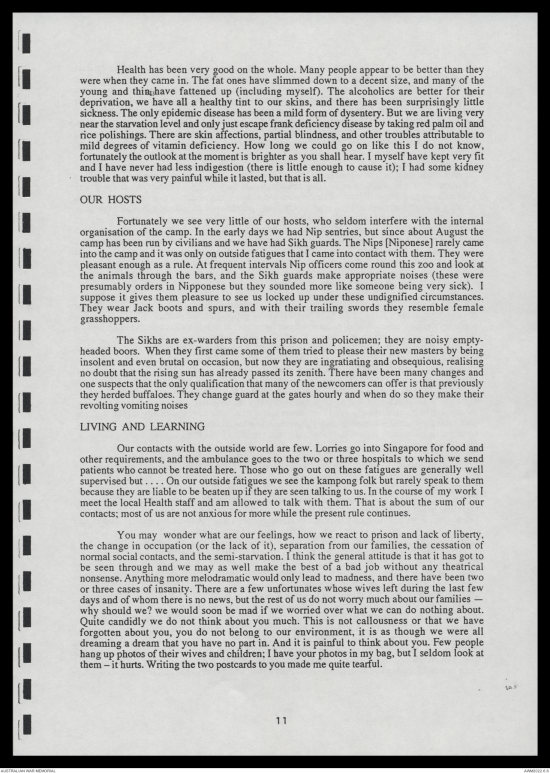
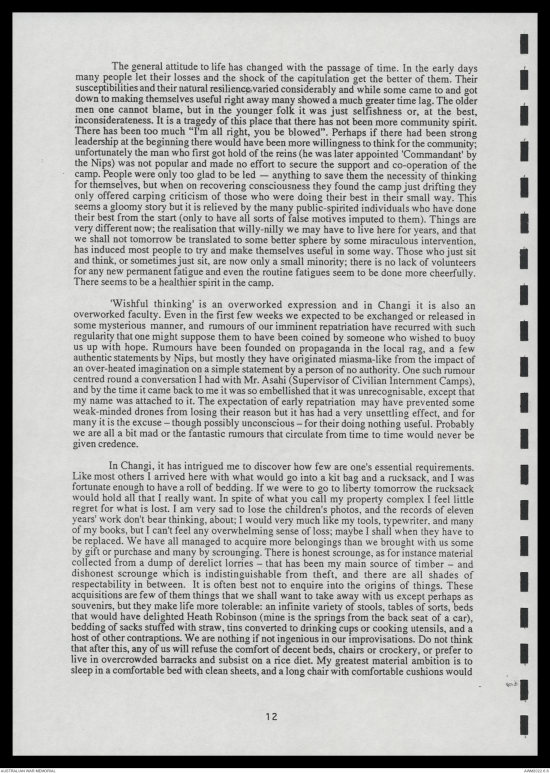
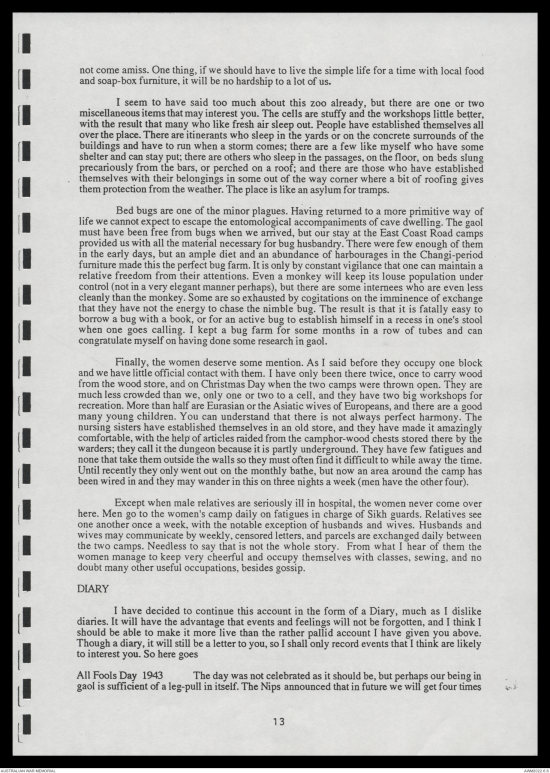
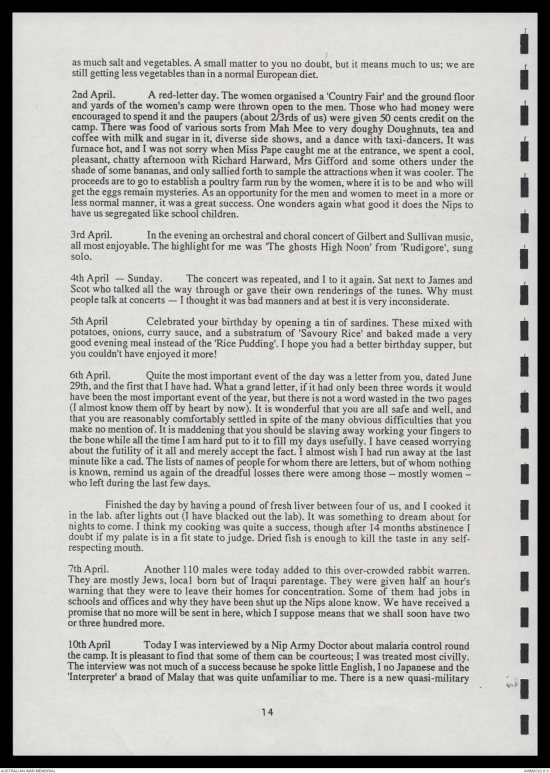
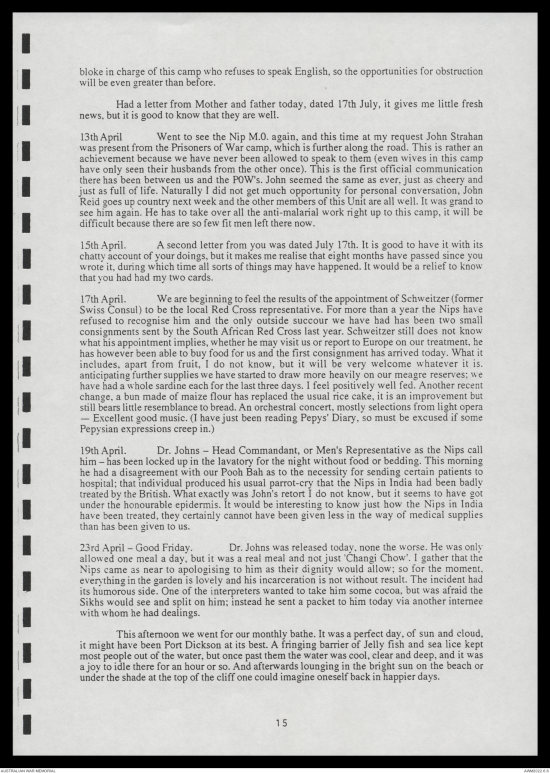
a few tables and chairs, or at least as many as there was room for after we had all packed
ourselves in like sardines in every room and passage in the place.
Conditions were naturally chaotic for the first few days, particularly as more people
continued to arrive. We were right on the sea shore and got all the bathing we wanted, that and
doing the few chores we had to do. The house was in a coconut plantation of a few acres, not much space in
which to wander but better than we have here, and there was sufficient space to allow me to put
up my tent and slap out on the comparatively soft ground instead of on the hard concrete.
Food queues were the main feature of the place, by the time one finished queuing up for
one meal, eaten it, and washed up it was almost time for the next food queue to start to form.
As the days went by we got more settled in, the overcrowding was eased to some
extent by fresh houses being taken over. Some folks started vegetable gardening in a small way
and after our fashion we managed to make ourselves reasonably comfortable. Classes of
various sorts were started - I took up shorthand, a newspaper came into being, barbers
appeared and tried their inexperienced hands on anyone willing to risk their necks,
and we foolishly thought we had settled in for the duration.One afternoon came a bolt from the
blue; we must move the next day to Changi Gaol! Well there was nothing for it but to pack our
bags again and prepare to move. This time we were told that we would have to walk but that
our luggage would go by lorry, so that all that had to be left behind was the beds (mostly
stretcher) that a few fortunates had managed to bring with them. We got quite a good feed that
night, with fresh bread and a decent ration of meat and fruit, and then we were issues with sufficient
tinned food to carry us over the next 36 hours or so. Up till then the food had been bad, short
in quantity and poor in quality, cooking of course was difficult and the utensils and cook
houses quite inadequate, but we had been given no food by the Japs and were living on what
our 'Communications Officers' could scrounge in town ( they were the only people allowed
to leave the camp). They got a fair quantity but those in charge of the stores, not having any
idea of how long the food had to last, were stingy with it.
The march to Changi will surely go down in history as one of the major events in the
war in the East ( you see how important we thought ourselves ) . Over two thousand of us
marched the seven miles along the coast road in the blazing mid-day sun, led by the Governor.
We must have looked a motley collection, dressed in every conceivable kind of outfit and
carrying a queer assortment of articles in bags, packs, sacks and all sorts of improvised
arrangements. I carried my rucksack and a camp bed mattress and was fairly lightly laden with
all necessaries for the next few days. A few distrustful folks tried to carry all their belongings,
with the result that muts such as myself had to help them out and carry more than our share.
CHANGI GAOL
It is a year since the forgoing account was written and it is high time I wrote
something about Changi and our life here. If my account should prove to be somewhat stilted
you must forgive me because I am attending a course in writing English.
How strange you must have thought it when you first heard that we were lodged in
gaol; how you must have pitied us, the discomfort and degradation of being treated as convicts.
Well of course it is not nice to live in prison, it is hardly the type of apartment house in which
one would choose to live. And yet we are not so badly off, there are a lot of advantages of
living in a large modern building even if it is labelled 'H.M. Prison'. So i hope you have not
wasted too much time on pity on us. I must tell you something of the prison itself if you are to
understand the rest of my story, so please bear with some architectural details.
To me the most obtrusive feature of Changi is the concrete; there are bars and there are
acres of expanded metal, but it is the endless expanse of concrete walls that characterises the
prison. Outside, a twenty-foot wall surrounds the whole gaol, broken only by a steel portcullis,
and relieved at the corners and in the middle of each side by watch towers resembling the
bridges of a fleet of modern liners. Indeed the whole place is somewhat ship-like. Inside the
6
area is broken up by slightly lower walls surrounding yards and block so buildings; separating
them so effectively that nothing larger than a cat can move from one part to another when the
communicating doors are closed. But to return to the main entrance. Inside the gate you cross
the 'girdle road' , which runs round inside the outer wall, and enter a hall or passage. On either
side and above this are the outer face. From the hall you enter a small courtyard cluttered up with
lorries and bits of them, timber and quantities of miscellaneous junk. The yard and the garages
off it are the home of the Carpenters' shop, the motor mechanics, coconut graters, the camp
'Shop', and various other activities. At 10 a.m. each day the yard is a mass of humanity waiting to go out on fatigues; but more of that anon.
From the front yard, passages diverge throughout the prison. On the left a gate gives
access to the women's camp (A Block), but there is a sentry to keep out mere males and keep
the females in. From straight ahead passages lead to all parts of the men's camp; straight ahead
to the kitchen, to the left to B Block, and on the right to C and D. The kitchen is a steamy place
that the ordinary internee is only permitted to visit when strictly on business. From the main
corridors others lead off to the laundry, hospital, and other ramifications of the fortress. There
are innumerable doors, but as they are never closed they do not obtrube themselves. I live in D
so let us explore that block, all four are much the same. Downstairs there is a large workshop
into which 150 people are crammed, each man having barely enough room to sleep in; with
makeshift beds, sardine-box furniture, and clothes lines, it looks like a Junk shop but so does
the whole camp. There is also the mess room, a long low room with two concrete slabs
running the length of it; the slabs serve for tables or beds as occasion demands. An exercise
yard that has long since ceased to have any grass on it completes the amenities of the ground
floor. The building bounds two sides of the yard and, under deep eaves, there are showers and
a concrete bench too high to sit on and too narrow to be much use as a table. A valiant effort
has been made to brighten up the yard by planting flowers and shrubs and this has been quite successful.
There are four floors of this delectable residence, and as the top three are all much
alike, we may as well climb the narrow steel stairs to the top floor where I live; D IV 6 is my a
address. and here I live with Jack Field, and Dr Mekie (for the first year Dr. McSwan was here
instead of Mekie). On either side of the grille that covers the central well there is a narrow
landing 200 feet long and off this the cells open, 22 of them on either side. At the far end there
is a grand view, through bars, over much of the eastern part of Singapore Island and over into
Johore. Needless to say the cells are all alike: a concrete box seven foot six by thirteen feet,
with a door that would have done justice to a medieval fortress, and two small barred
apertures for ventilation, one above the door and the other high up the opposite end. The
only furnishings provided by His Majesty are a 'sarcophagus' in the centre ( a concrete slab
provided with a pillow of the same material), a small hole high up in one wall with a light
shared with the next cell, and a squat latrine. That is all; even the lavatory tank is outside and
operated by a rod and chain, to pull which was the only entertainment vouchsafed to H.M's
guests. Needless to say the cell is no longer so bare. The flimsy improvisations of our early
days have been replaced by quite solid, if not very elegant, shelves, cupboards, stools, and
even a small table. Jack and Mekie have fixed up hammocks in the 'slit trenches' between the sarcophagus and the walls; I sleep out of doors. The furnishings of cells vary endlessly with
the tastes, belongings, and scrounging abilities of the occupants. Some are so full that the
inmates have to sleep on top of their belongings, which there are a few - very few - still
unblemished by a single nail.
The kitchen, as I said, is in the centre of the camp; above it there are more cells (in one
of these the Governor lived for a time, in all the steam and heat from the kitchen ). Beyond the
kitchen is the laundry; a large hall with concrete tanks round the walls and long wooden tables
dotted about the centre. From the tanks one ladles water Malayan-fashion over one's body, and on the tables we scrub our clothes. Perhaps you had not realised that we have to do everything
for ourselves cooking, cleaning, firewood collecting, refuse disposal, as well as being one's
own dhobi (washerman). At all times from 7.30a.m. to 8.15 p.m. the laundry is full of naked
bodies bathing or washing their clothes. Not a very elegant sight you will think, but no one
7
worries about that and the varieties of shapes, forms and colourings is very diverting. Do you remember the little white pants the children used to develop at Port Dickson? well everyone has them here; a white skinned torso is the exception. At one end of the laundry are the cobblers shop and the library; but more of that later.
To either side of the laundry are the main yard and the vegetable garden. The garden is green with ceylon spinach, bayam, kangkong, and sweet potato, and small as it is we get surprisingly good crops thanks to fertiliser and the lavish use of urine. The main yard is largely bare earth; part is used for football, though its unevenness makes it a decidedly sporting pitch; part is a swill dump, and a very small area is grassed over. In one corner is the stage, which has been the centre of many enjoyable evenings; it is a very effective improvisation with a roof, curtains lighting, and matting on which scenery is painted.
Before finishing this lengthy tour I must mention two other features. Firstly there is the hospital, which is two-storey dormitory, and the building that houses the dispensary, theatre, and laboratory, with a small yard on either side of it. I spend most of my time in the lab or in one or other of the yards. One yard we use for carpentering and in a corner of the other I have my tent and sleep out. Secondly there is 'Hudson's Bay' originally the punishment cells but now one of the best parts of the camp in which to live, because it is only one storey high and is surrounded by its own small but pleasant yard (Sands lives in the flogging room!).
THE INHABITANTS
I have said too much about the buildings so let's turn to the inhabitants. There are about three thousand of us (in a prison built for six hundred), mostly British but with a sprinkle of Dutch American, Norwegian, and about a dozen other races including a Maori, not to mention a number of Eurasians. About six hundred are women and children and of them more than half are Eurasians; they are the wives, children and grand-children of people who have settled in Malaya. (There were also a number of Asiatic wives of Europeans, including
Japanese). The whole male European population of Malaya is here or in the Prisoner of War camp; except for a few neutrals, the few who got away or are interned in Java or Sumatra, and a very few who are working in Singapore. The youngest internee is a few months old and the oldest is over eighty. There are many old men who had settled down in Singapore or up country and internment comes hardest on them. In addition there are more than a hundred stewards from the 'Empress of Asia' - they provide the comic relief of the camp - and a few
sailors and others who have been captured since the capitulation. With such a variety living in such cramped conditions it is surprising how smoothly everything goes. Tolerance is the keynote of the camp, tolerance of the peculiarities of others, of their manners, appearance, and dress. Dress is seldom more than a pair of shorts, and appearance: man is not a beautiful animal at the best of times but hairy bodies and flowing beards do not make him look any better.
You can well imagine that, with such different temperaments, Jack and I do not always see eye to eye, but we live together quite peacefully and there are far more ill-assorted cell-mates (two M.C.S. and a Eurasian for example). One of the most pleasant part of life here is the lack of social barriers, there can be none when neither position nor wealth have any
significance and when the only garment worn is a pair of shorts; but it is wonderful to find how willing
everyone is to be friendly with anyone else. The comradeship is one of the outstanding features of the camp, one that almost makes one glad to have been interned. For myself I have made many new and valued friends, and seem to be on nodding acquaintance with half the camp. Of course there is the comic side of this too; the camp has developed its own hierarchy of Block Commandants, Committee members and a host of officials. There is the nouveau riche; those who, having no scruples, have not hesitated to trade on those of others; the
organisers of the 'black market', the folks who (until stopped) raffled a $5 note for $70, and the few quite unashamed thieves.
You will have wondered how we occupy ourselves and perhaps fancied that time hangs heavy on our hands. I suppose it must do for many, but I have never been at a loss for
8
something to do since I came here. Much of our day is taken in looking after ourselves, and in this respect life here does resemble a camp. The daily routine is simple; lights on at 7.30 (this is Tokyo time, two hours ahead of sun time), bath, shave, grate and squeeze the coconut to make coconut milk for breakfast, breakfast at 9.0, jobs of various sorts until lunch at 1.0, supper at 6.0, lights out at 10.0, and in my case bed at about 11.0. Such is the day, but into it have to be fitted all sorts of odd jobs, washing up, sweeping or washing out the cell, washing and repairing clothes. There are always 'fatigues' to be done; for most these are such as are allocated to them and only take at the most four hours a week, they include; hauling firewood, sweeping passages, flattening burnt tins, and host of others. For the first five months my job was Secretary to D Block Committee; a thankless task consisting mostly of running errands and chasing other people. For the last few months my official job has been making a mosquito survey of the area round the camp. It is a pleasant job which gives me more freedom than most enjoy. Up to five of us go out about three mornings a week and are free to wander anywhere within a mile of the camp. We have a Sikh guard for company. It is fun being my own mosquito collector for a change, and, although there is a disappointing lack of variety in the anopheline fauna, I have been able to build up a small collection of the commoner species. When not mosquito hunting I spend most of my time carpentering, I make furniture for the lab and hospital, and innumerable stools, and before Christmas I made a set of Abbat toys for the infant school. I have learnt a lot about woodworking and have ambitions to become a cabinet maker!
In these ways then there is plenty to do, and when not working I am seldom idle; there are lectures to attend or to prepare, classes and 'homework', entertainments and reading. The hour after lights out is very pleasantly spent in talking, usually with the same circle of friends, of the affairs of the camp or the world, sometimes in frivolous vein and sometimes of serious topics. Conversation ranges from food and the lack of it, the latest rumour and the prospects of exchange, to the physiological effects of starvation, or to astronomy (this last is a popular subject when the sky is clear).
The opportunity for reading is a great joy; I must have read more while in Changi than ever before. Naturally there is not a great choice of literature, but the library has five or six thousand volumes. Knowing your liking for Buchan I have read and enjoyed many of his novels, and it has been fun to re-read many old favourites. The library has also a few reference books; they include an Encyclopedia Britannica, which you might call the Changi Bible it is so constantly in demand by lecturers and others in search of knowledge. The books are naturally heavily overworked and have often to be repaired in a somewhat amateurish manner. The sight of the shelves would give a librarian a heart attack. As with everything in Changi there is a snag even in this. The lights in the cells are bad (not that I spend much time there) and my eyes are giving me trouble. Some people have gone partially blind, but that is a lack of vitamin x, y, or z, combined with smoking.
One of the most amazing features of the camp is the thirst for knowledge that is displayed. Many no doubt started attending classes in order to occupy themselves usefully, but most are glad of the chance to study something they never had time for before. Changi University has classes in more than ninety subjects; languages from Gaelic to Siamese, Mechanics, Navigation, Astronomy, and a host of others. The classes last an hour and are held two or three times a week. In the early days I was too busy to want to attend any classes, besides I had my own lectures to prepare. Now I am studying English writing, with Mr. Richard Sidney, in the hope that my papers will be less of a labour to prepare and more
intelligible to the reader. With two or three thousand others I have gone back to school and am thoroughly enjoying it.
In addition to the regular classes there are almost nightly lectures on subjects of general and special interest; most countries in the news have been dealt with by someone with first hand knowledge. Malaya is being discussed in all its aspects in a long series of lectures, and there have been innumerable lectures in light or serious vein on every conceivable subject. Jack and I gave a series of lectures on malaria, or rather two series for they had to be repeated; and I
made a rather unhappy attempt to lecture on medical entomology. This was a very difficult
9
undertaking with only Manson Bahr and the Encyclopedia Britannica for reference. The most
interesting lectures I have attended have been organised by the Malayan Nature Society, dealing
with Anthropology, Malayan Jungle trips, and a host of other subjects. A recent innovation has been a fortnightly 'question hour', at which written questions of general interest are answered shortly by experts. Naturally most are scientific, but others are economic, historical, etc. I had to answer one on ants, not that I know much about them. This is a very popular diversion.
There has been no lack of entertainment. The early efforts were a bit primitive; variety shows performed on laundry tables, with the effects left to the imagination and the only musical accompaniment a piano accordion and a violin; but concerts have never been better attended than they were in those days. Now there is a stage, not quite up to West End standards perhaps but with scenery, curtains, and footlights. On it have been performed; a pantomime (Dick Whittington Changified), Dickens 'A Christmas Carol', 'Outward Bound', innumerable variety shows, orchestral and choral concerts far superior to anything we ever had in K.L., and many other entertainments. A few of the best have been repeated for the benefit of the ladies. We have also had delightful readings of Shaw's 'The Apple Cart", and 'The Whiteheaded Boy' (on St.Patrick's Day). There is a lot to be said for leaving the scenery to the imagination. To anyone but an internee the audience would be the more interesting part of the performance. We must look a motley crew, half-naked perched on the oddest assortment of substitutes for chairs from well made chairs to sardine boxes.
FOOD
You will want to know what we have to eat. This is a dismal subject about which the less said the better. It is not pleasant to suffer systematic starvation. Rice, rice, and yet more rice, there is plenty of it so far, but man cannot live on rice alone. The Nip.[Nipponese] issue of meat would not keep a mouse alive and even that ceased last November; since then all we have had has been a little dried fish. By Changi standards the fish can be rendered edible by frying it until it is the consistency of leather. In addition we have been given a little sugar, less salt, some ghee, vegetables of the least nutritious kind, and for a time a little flour. Had it not been that we brought with us [cases] of tinned food and have been allowed to buy more with our quite inadequate funds, many of us would have died before now of beri beri or other deficiency diseases. Even as it is things are pretty grim. We produce a fair quantity of leaf vegetable in the inside garden, and recently we have been allowed to plant more of these and root vegetables outside the walls. The kitchen has done wonders making the food palatable, but oh for a good square meal:
The menu varies little from day to day. For breakfast there is kunji and tea; for lunch steamed rice and vegetable soup, with a little sardine, chicken curry, or corned beef added to it, and once a week there is stinking fish and savoury rice (a poor relation of kedgeree); and for supper there is more kunji, tea and a rice-coconut cake. Kunji is wet rice, a sort of rice pudding without all the ingredients that make that dish palatable; there is said to be a suspicion of sugar and milk in it but most of us suspect that that does not go outside the kitchen. Later feeling ran so high on this matter that all sugar was issued 'on the hoof' to individuals. Rice polishings are added to the morning kunji to keep the beri beri away, and the evening kunji is flavoured with cocoa, fruit juice (mostly pumpkin), gula malacca (a sugar made by tapping palms), or something that smells like Cutex. Not very appetising, but it goes down. Most of us have acquired a few tins by fair means or foul and we have an occasional feed that resembles a meal.
I am the cook for our trio so you can draw your own conclusions. We celebrate all birthdays in this way, yours as well as ours, and between the three of us we have seventeen!
Eating utensils are as primitive as the food; spoon, knife, fork (rarely needed), a plate of sorts (mine is a pie dish), and a mug (mine is a silver beer-mug); they are a motley selection, whatever people have been able to pick up at the last moment or have been able to obtain since. The food has to be carried up to the floors in wooden tongs and kerosene tins, and there it is distributed to the waiting queues. Few possess tables of any sort so they have to put their plates on the sarcophagus or on their knees.
10
Health has been very good on the whole. Many people appear to be better than they were when they came in. The fat ones have slimmed down to a decent size, and man of the young and thin have fattened up (including myself). The alcoholics are better for their deprivation, we have all a healthy tint to our skins, and there has been surprisingly little sickness. The only epidemic disease has been a mild form of dysentery. But we are living very near the starvation level and only just escape frank deficiency disease by taking red palm oil and rice polishings. There are skin affections, partial blindness, and other troubles attributable to mild degrees of vitamin deficiency. How long we could go on like this I do not know, fortunately the outlook at the moment is brighter as you shall hear. I myself have kept very fit and I have never had less indigestion (there is little enough to cause it); I had some kidney trouble that was very painful while it lasted, but that is all.
OUR HOSTS
Fortunately we see very little of our hosts, who seldom interfere with the internal organisation of the camp. In the early days we had Nip sentries, but sine about August the camp has been run by civilians and we have had Sikh guards. The Nips [Niponese] rarely came into the camp and it was only on outside fatigues that I came into contact with them. They were pleasant enough as a rule. At frequent intervals Nip officers come round this zoo and look at the animals through the bars, and the Sikh guards make appropriate noises (these were
presumably orders in Nipponese but they sounded more like someone being very sick). I suppose it gives them pleasure to see us locked up under these undignified circumstances. They wear Jack boots and spurs, and with their trailing swords they resemble female grasshoppers.
The Sikhs are ex-warders from this prison and policemen; they are noisy empty-headed boors. When they first came some of them tried to please their new masters by being insolent and even brutal on occasion, but now they are ingratiating and obsequious, realising no doubt that the rising sun has already passed its zenith. There have been many changes and one suspects that the only qualification that many of the newcomers can offer is that previously they herded buffaloes. They change guard at the gates hourly and when do so they make their revolting vomiting noises.
LIVING AND LEARNING
Our contacts with the outside world are few. Lorries go into Singapore for food and other requirements, and the ambulance goes to the two or three hospitals to which we send patients who cannot be treated here. Those who go out on these fatigues are generally well supervised but . . . . On our outside fatigues we see the kampong folk but rarely speak to them because they are liable to be beaten up if they are seen talking to us. In the course of my work I meet the local Health staff and am allowed to talk with them. That is about the sum of our contacts; most of us are not anxious for more while the present rule continues.
You may wonder what are our feelings, how we react to prison and lack of liberty, the change in occupation (or lack of it), separation from our families, the cessation of normal social contacts, and the semi-starvation. I think the general attitude is that it has got to be seen through and we may as well make the best of a bad job without any theatrical nonsense. Anything more melodramatic would only lead to madness, and there have been two or three cases of insanity. There are a few unfortunates whose wives left during the last few days and of whom there is no news, but the rest of us do not worry much about our families - why should we? we would soon be mad if we worried over what we can do nothing about. Quite candidly we do not think about you much. This is not callousness or that we have forgotten about you, you do not belong to our environment, it is as though we were all dreaming a dream that you have no part in. And it is painful to think about you. Few people hang up photos of their wives and children; I have your photos in my bag, but I seldom look at them- it hurts. Writing the two postcards to you made me quite tearful.
11
The general attitude to life has changed with the passage of time. In the early days many people let their losses and the shock of the capitulation get the better of them. Their susceptibilities and their natural resilience varied considerably and while some came to and got down to making themselves useful right away many showed a much greater time lag. The older men one cannot blame, but in the younger folk it was just selfishness or, at the best, inconsiderateness. It is tragedy of this place that there has not been more community spirit. There has been too much " I'm all right, you be blowed". Perhaps if there had been strong leadership at the beginning there would have been more willingness to think for the community; unfortunately the man who first got hold of the reins (he was later appointed 'Commandant' by the Nips) was not popular and made no effort to secure the support and co-operation of the camp. People were only offered carping criticism of those who were doing their best in their small way. This seems a gloomy story but it is relieved by the many public-spirited individuals who have done their best from the start (only to have all sorts of false motives imputed to them). Things are very different now; the realisation that willy-nilly we may have to live here for years, and that we shall not tomorrow be translated to some better sphere by some miraculous intervention, has induced most people to try and make themselves useful in some way. Those who just sit and think, or sometimes just sit, are now only a small minority; there is no lack of volunteers for any new permanent fatigue and even the routine fatigues seem to be done more cheerfully. There seems to be a healthier spirit in the camp.
'Wishful thinking' is an overworked expression and in Changi it is also an overworked faculty. Even in the first few weeks we expected to be exchanged or released in some mysterious manner, and rumours of our imminent repatriation have recurred with such regularity that one might suppose them to have been coined by someone who wished to buoy us up with hope. Rumours have been founded on propaganda in the local rag, and a few authentic statements by Nips, but mostly they have originated miasma-like from the impact of an over-heated imagination on a simple statement by a person of no authority. One such rumour centred round a conversation I had with Mr. Asahi (Supervisor of Civilian Internment Camps), and by the time it came back to me it was so embellished that it was unrecognisable, except that my name was attached to it. The expectation of early repatriation may have
prevented some weak-minded drones from losing their reason but it has had a very unsettling effect, and for many it is the excuse - though possibly unconscious - for their doing nothing useful. Probably we are all a bit mad or the fantastic rumours that circulate from time to time would never be given credence.
In Changi, it has intrigued me to discover how few are one's essential requirements. Like most others I arrived here with what would go into a kit bag and a rucksack, and I was fortunate enough to have a roll of bedding. If we were to go to liberty tomorrow the rucksack would hold all that I really want. In spite of what you call my property complex I feel little regret for what is lost. I am very sad to lose the children's photos, and the records of eleven years' work don't bear thinking about; I would very much like my tools, typewriter, and many of my books, but I can't feel any overwhelming sense of loss; maybe I shall when they have to be replaced. We have all managed to acquire more belongings than we brought with us some by gift or purchase and many by scrounging. There is honest scrounge, as for instance material collected from a dump of derelict lorries - that has been my main source of timber - and dishonest scrounge which is indistinguishable from theft, and there are all shades of respectability in between. It is often best not to enquire into the origins of things. These acquisitions are few of them things that we shall want to take away with us except perhaps as souvenirs, but they make life more tolerable; an infinite variety of stools, tables of sorts, beds that would have delighted Heath Robinson (mine is the springs from the back seat of a car), bedding of sacks stuffed with straw, tins converted to drinking cups or cooking utensils, and a host of other contraptions. We are nothing if not ingenious in our improvisations. Do not think that after this, any of us will refuse the comfort of decent beds, chairs or crockery, or prefer to live in overcrowded barracks and subsist on a rice diet. My greatest material ambition is to sleep in a comfortable bed with clean sheets, and a long chair with comfortable cushions would
12
not come amiss. One thing, if we should have to live the simple life for a time with local food and soap-box furniture, it will be no hardship to a lot of us.
I seem to have said too much about this zoo already, but there are one or two miscellaneous items that may interest you. The cells are stuffy and the workshops little better, with the result that many who like fresh air sleep out. People have established themselves all over the place. There are itinerants who sleep in the yards or on the concrete surrounds of the buildings and have to run when a storm comes; there are a few like myself who have some shelter and can stay put; there are others who sleep in the passages, on the floor, on beds slung precariously from the bars, or perched on a roof; and there are those who have established themselves with their belongings in some out of the way corner where a bit of roofing gives them protection from the weather. The place is like an asylum for tramps.
Bed bugs are one of the minor plagues. Having returned to a more primitive way of life we cannot expect to escape the entomological accompaniments of cave dwelling. The gaol must have been free from bugs when we arrived, but our stay at the East Coast Road camps provided us with all the material necessary for bug husbandry. There were few enough of them in the early days, but an ample diet and an abundance of harbourages in the Changi-period furniture made this the perfect bug farm. It is only by constant vigilance that one can maintain a relative freedom from their attentions. Even a monkey will keep its louse population under control (not in a very elegant manner perhaps), but there are some internees who are even less cleanly than the monkey. Some are so exhausted by cogitations on the imminence of exchange that they have not the energy to chase the nimble bug. The result is that it is fatally easy to borrow a bug with a book, or for an active bug to establish himself in a recess in one's stool when one goes calling. I kept a bug farm for some months in a row of tubes and can congratulate myself on having done some research in gaol.
Finally, the women deserve some mention. As I said before they occupy one block and we have little official contact with them. I have only been there twice, once to carry wood from the wood store, and on Christmas Day when the two camps were thrown open. They are much less crowded than we, only one or two to a cell, and they have two big workshops for recreation. More than half are Eurasian or the Asiatic wives of Europeans, and there are a good many young children. You can understand that there is not always perfect harmony. The nursing sisters have established themselves in an old store, and they have made it amazingly comfortable, with the help of articles raided from the camphor-wood chests stored there by the warders; they call it the dungeon because it is partly underground. They have few fatigues and none that take them outside the walls so they must often find it difficult to while away the time. Until recently they only went out on the monthly bathe, but now an area around the camp has been wired in and they may wander in this on three nights a week (men have the other four).
Except when male relatives are seriously ill in hospital, the women never come over here. Men go to the women's camp daily on fatigues in charge of Sikh guards. Relatives see one another once a week, with the notable exception of husbands and wives. Husbands and wives may communicate by weekly, censored letters, and parcels are exchanged daily between the two camps. Needless to say that is not the whole story. From what I hear of them the women manage to keep very cheerful and occupy themselves with classes, sewing, and no doubt many other useful occupations, besides gossip.
DIARY
I have decided to continue this account in the form of a Diary, much as I dislike diaries. It will have the advantage that events and feelings will not be forgotten, and I think I should be able to make it more live than the rather pallid account I have given you above. Though a diary, it will still be a letter to you, so I shall only record events that I think are likely to interest you. So here goes.
All Fools Day 1943 The days was not celebrated as it should be, but perhaps our being in gaol is sufficient of leg-pull in itself. The Nips announced that in future we will get four times
13
as much salt and vegetables. A small matter to you no doubt, but it means much to us; we are still getting less vegetables than in a normal European diet.
2nd April. A red-letter day. The women organised a 'Country Fair' and the ground floor and yards of the women's camp were thrown open to the men. Those who had money were encouraged to spend it and the paupers (about 2/3rds of us)were given 50 cents credit on the camp. There was food of various sorts from Mah Mee to very doughy Doughnuts, tea and coffee with milk and sugar in it, diverse side shows, and a dance with taxi-dancers. It was furnace hot, and I was not sorry when Miss Pape caught me at the entrance, we spent a cool, pleasant, chatty afternoon with Richard Harward, Mrs Gifford and some others under the shade of some bananas, and only sallied forth to sample the attractions when it was cooler. The proceeds are to go to establish a poultry farm run by the women,where it is to be and who will get the eggs remain mysteries. As an opportunity for the men and women to meet in a more or less normal manner, it was a great success. One wonders again what good it does the Nips to have us segregated like school children.
3rd April. In the evening an orchestral and choral concert of Gilbert and Sullivan music, all most enjoyable. The highlight for me was 'The ghosts High Noon' from 'Rudigore', sung solo.
4th April - Sunday. The concert was repeated, and I to it again. Sat next to James and Scot who talked all the way through or gave their own renderings of the tunes. Why must people talk at concerts - I thought it was bad manners and at best it is very inconsiderate.
5th April Celebrated your birthday by opening a tin of sardines. These mixed with potatoes, onions, curry sauce, and a substratum of 'Savoury Rice' and baked made a very good evening meal instead of the 'Rice Pudding'. I hope you had a better birthday supper, but you couldn't have enjoyed it more!
6th April. Quite the most important event of the day was a letter from you, dated June 29th, and the first that I have had. What a grand letter, if it had only been three words it would have been the most important event of the year, but there is not a word wasted in the two pages (I almost know them off by heart by now). It is wonderful that you are all safe and well, and that you are reasonably comfortably settled in spite of the many obvious difficulties that you make no mention of. It is maddening that you should be slaving away working your fingers to the bone while all the time I am hard put to it to fill my days usefully. I have ceased worrying about the futility of it all and merely accept the fact. I almost wish I had run away at the last minute like a cad. The lists of names of people for whom there are letters, but of whom nothing is known, remind us again of the dreadful losses there were among those - mostly women - who left during the last few days.
Finished the day by having a pound of fresh liver between four of us, and I cooked it in the lab, after lights out (I have blacked out the lab). It was something to dream about for nights to come. I think my cooking was quite a success, though after 14 months abstinence I doubt if my palate is in a fit state to judge. Dried fish is enough to kill the taste in any self-respecting mouth.
7th April. Another 110 males were today added to this over-crowded rabbit warren. They are mostly Jews, local born but of Iraqui parentage. They were given half an hour's warning that they were to leave their homes for concentration. Some of them had jobs in
schools and offices and why they have been shut up the Nips alone know. We have received a promise that no more will be sent in here, which I suppose means that we shall soon have two or three hundred more.
10th April Today I was interviewed by Nip Army Doctor about malaria control round the camp. It is pleasant to find that some of them can be courteous; I was treated most civilly. The interview was not much of a success because he spoke little English, I no Japanese and the 'Interpreter' a brand of Malay that was quite unfamiliar to me. There is a new quasi-military
14
bloke in charge of this camp who refuses to speak English, so the opportunities for obstruction will be even greater than before.
Had a letter from Mother and father today, dated 17th July, it gives me little fresh news, but itis good to know that they are well.
13th April Went to see the Nip M.O. again, and this time at my request John Strahan was present from the Prisoners of War camp, which is further along the road. This rather an achievement because we have never been allowed to speak to them (even wives in this camp have only seen their husbands from the other once). This is the first official communication there has been between us and the POW's. John seemed the same as ever, just as cheery and just as full of life. Naturally, I did not get much opportunity for personal conversation, John Reid goes up country next week and the other members of this Unit are all well. It was grand to see him again. He has to take over all the anti-malarial work right up to this camp, it will be difficult because there are so few fit men left there now.
15th April. A second letter from you was dated July 17th. It is good to have it with its chatty account of your doings, but it makes me realise that eight months have passed since you wrote it, during which time all sorts of things may have happened. It would be a relief to know that you had had my two cards.
17th April. We are beginning to feel the results of the appointment of Schweitzer (former Swiss Consul) to be the local Red Cross representative. For more than year the Nips have refused to recognise him and the only outside succour we had had has been two small consignments sent by the South African Red Cross last year. Schweitzer still does not know what his appointment implies, whether he may visit us or report to Europe on our treatment, he has however been able to buy food for us and the first consignment has arrived today. What it includes, apart from fruit, I do not know, but it will be very welcome whatever it is, anticipating further supplies we have started to draw more heavily on our meagre reserves; we have had a whole sardine each for the last three days. I feel positively well fed. Another recent change, a bun made of maize flour has replaced the usual rice cake, it is an improvement but still bears little resemblance to bread. An orchestral concert, mostly selections from light opera - Excellent good music. (I have just been reading Pepy's Diary, so must be excused if some Pepysian expressions creep in).
19th April. Dr. Johns - Head Commandant, or Men's Representative as the Nips call him - has been locked up in the lavatory for the night without food or bedding. This morning he had a disagreement with our Pooh Bah as to the necessity for sending certain patients to hospital; that individual produced his usual parrot-cry that the Nips in India had been badly treated by the British. What exactly was John's retort I do not know, but it seems to have got under the honourable epidermis. It would be interesting to know just how the Nips in India have been treated, they certainly cannot have been given less in the way of medical supplies than has been given to us.
23rd April - Good Friday. Dr. Johns was released today, none the worse. He was only allowed one meal a day, but it was a real meal and not just 'Changi Chow'. I gather that the Nips came as near to apologising to him as their dignity would allow; so for the moment, everything in the garden is lovely and his incarceration is not without result. The incident had its humorous side. One of the interpreters wanted to take him some cocoa, but was afraid the Sikhs would see and split on him; instead he sent a packet to him today via another internee with whom he had dealings.
This afternoon we went for our monthly bathe. It was a perfect day, of sun and cloud, it might have been Port Dickson at its best. A fringing barrier of Jelly fish and sea lice kept most people out of the water, but once past them the water was cool, clear and deep, and it was a joy to idle there for an hour or so. And afterwards lounging in the bright sun on the beach or under the shade at the top of the cliff one could imagine oneself back in happier days.
15
 Sam scott
Sam scottThis transcription item is now locked to you for editing. To release the lock either Save your changes or Cancel.
This lock will be automatically released after 60 minutes of inactivity.